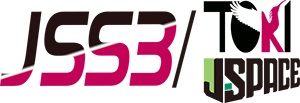Magnetohydrodynamic modeling of space plasma processes
JAXA Supercomputer System Annual Report April 2018-March 2019
Report Number: R18EACA28
Subject Category: JSS2 Inter-University Research
- Responsible Representative: Seiji Zenitani, Researcher, Kyoto University
- Contact Information: Seiji Zenitani(zenitani@rish.kyoto-u.ac.jp)
- Members: Seiji Zenitani, Iku Shinohara, Takahiro Miyoshi
Abstract
This project investigates basic processes in space plasmas, by using supercomputer simulations. In particular, we study “magnetic reconnection” in space, an abrupt change in magnetic topology. In order to support research activities by ourselves and by other groups, we develop massively-parallel simulation codes. They are publicly available on the Internet.
Reference URL
Please refer to ‘OpenMHD code‘.
Reasons for using JSS2
Space plasma processes are basically described by magnetohydrodynamics (MHD) equations, which are notoriously complex. Supercomputer simulation is necessary to predict the nonlinear evolution of the system.
Achievements of the Year
We have studied basic properties of plasmoid-dominated turbulent reconnection in solar coronal conditions. By carrying out a series of large-scale magnetohydrodynamic (MHD) simulations, we have found that the energy consumption rate is faster than expected in high (magnetic) Reynolds number regimes for solar corona. We have also investigated influence of the flow shear in plasmoid-dominated reconnection [1].
We have renewed our simulation code. The latest code employs MPI nonblocking procedures in the halo communication and better domain decomposition methods. As a consequence, its strong-scaling efficiency is 94% for 5000 cores. We implemented an MPI-MPI hybrid parallelization code, but it has a problem in some situations. We are currently investigating this issue. The latest version of the MHD code is publicly available as a 2019 edition of “OpenMHD” code.
Publications
– Peer-reviewed papers
1) M. Hosseinpour, Y. Chen, and S. Zenitani, On the effect of parallel shear flow on the plasmoid instability, Physics of Plasmas, 25, 102117 (2018)
2) S. Zenitani and T. Umeda, On the Boris solver in particle-in-cell simulation, Physics of Plasmas, 25, 112110 (2018)
Usage of JSS2
Computational Information
- Process Parallelization Methods: MPI
- Thread Parallelization Methods: OpenMP
- Number of Processes: 40 – 2000
- Elapsed Time per Case: 36 Hour(s)
Resources Used
Fraction of Usage in Total Resources*1(%): 0.06
Details
Please refer to System Configuration of JSS2 for the system configuration and major specifications of JSS2.
| System Name | Amount of Core Time(core x hours) | Fraction of Usage*2(%) |
|---|---|---|
| SORA-MA | 555,906.29 | 0.07 |
| SORA-PP | 0.00 | 0.00 |
| SORA-LM | 0.00 | 0.00 |
| SORA-TPP | 0.00 | 0.00 |
| File System Name | Storage Assigned(GiB) | Fraction of Usage*2(%) |
|---|---|---|
| /home | 67.29 | 0.07 |
| /data | 1,228.12 | 0.02 |
| /ltmp | 3,146.70 | 0.27 |
| Archiver Name | Storage Used(TiB) | Fraction of Usage*2(%) |
|---|---|---|
| J-SPACE | 0.00 | 0.00 |
*1: Fraction of Usage in Total Resources: Weighted average of three resource types (Computing, File System, and Archiver).
*2: Fraction of Usage:Percentage of usage relative to each resource used in one year.
JAXA Supercomputer System Annual Report April 2018-March 2019


